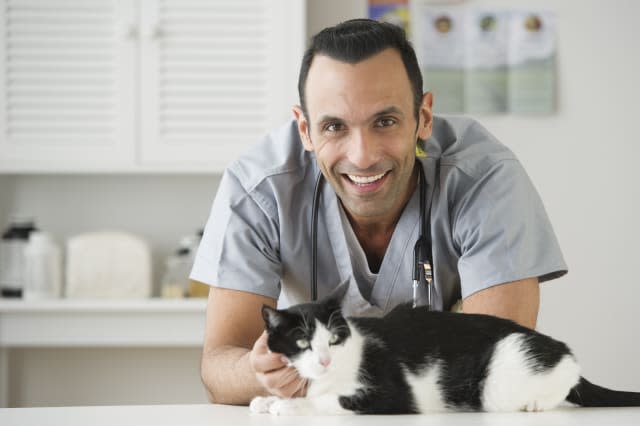So you want to work with animals? Here's how

Ask a primary school class what they plan to do when they grow up, and you'll be presented with a future society consisting almost entirely of doctors, footballers - and vets.
In this nation of animal-lovers, it's one of the most popular career options for young children; and indeed many people carry on hankering to work with animals right into adulthood.
But where do you start? We look at some of the paths you can take, whatever your level of education.
Vet
To be a vet, you'll need a recognised veterinary degree - currently available from Bristol, Cambridge, Edinburgh, Glasgow, Liverpool, London's Royal Veterinary College and Nottingham.
To win a place, you'll need solid science A levels, including biology and chemistry; courses take five or in some cases six years.
Starting salaries average £29,000 a year, rising to over £50,000 for a senior partner; some vets specialise in small animal practice, and others in farming.
"It can be a mucky old job, but it's great to be working in the fresh air, out on the road," says large animal vet Jon Reader. "Some days you go out to a difficult calving and come away with a healthy cow and live calf - everyone's happy!"
The Royal College of Veterinary Surgeons (RCVS) has more information here.
Veterinary nurse
The entry requirements to be a veterinary nurse are rather less hard to achieve, letting you qualify either through work-based training or through a higher education course.
The training route involves either an advanced apprenticeship in Veterinary Nursing or a college course that includes work placements; both lead to the Level 3 Diploma in Veterinary Nursing qualification. You'll need five GCSEs or other equivalent qualifications to get in.
Alternatively, you can take an RCVS-approved veterinary nursing degree, which takes three or four years. For this, you'll need at least two A levels, preferably including chemistry and biology.
Salaries start at around £18,000 a year; there's more information here.
Animal care assistant
There are an enormous number of jobs caring for animals around, and the good news is that very few qualifications are required. At most, you'll need a few GCSEs, and experience, such as having volunteered, will count for far more.
The bad news is that starting pay is poor - around £11,000 a year - and you may be required to work antisocial hours.
But there's great demand from rescue centres, charities or kennels, and it's easy to get a bit of volunteering experience to help you get a foot in the door. The work's satisfying and varied, involving everything from feeding, grooming and exercising animals to dealing with members of the public.
There's more information, including contact details for several animal charities, here.
Dog walker
Dog walkers can make a surprising amount of money: research from Direct Liner Pet Insurance last year found them charging an average of £11.50 per hour per dog. Most take out several dogs at a time and can manage two or three walks a day, adding up to a tidy little sum.
But it's not all a walk in the park. You'll probably need to have a vehicle to pick dogs up and take them to a suitable spot, and you'll need to be able to transport them safely. You'll have to be able to control the animals - and possibly break up fights - and you'll also need insurance.
RSPCA inspector
To become a trainee, you'll need five good GCSEs, including English and maths, and a driving licence - you could be driving 25,000 miles a year. You'll need to be fit, and a reasonable swimmer.
Experience of working with animals is a must - and you'll need to be able to cope with distressing situations.
The job involves more than checking out cruelty complaints: inspectors also check out pet shops, kennels and the like, as well as events such as agricultural shows.
Trainees start on £19,284, while qualified inspectors earn between £24,000 and £27,000 a year.
"The job is so much better than I ever imagined it would be. I've dealt with everything from caterpillars to whales and there is never a day when I don't want to go to work," says inspector Justin Stubbs.
"The job is a lot harder than people realise and a lot harder than I gave it credit for. But it's at least as rewarding as people think."
The RSPCA jobs page is here.
Zookeeper
Perhaps surprisingly, you don't need any special qualifications to work in a zoo - a few GCSEs are likely to do. You will, though, need to show a keen interest in wildlife conservation, and most employers will expect you to have some experience - possibly from volunteering there.
You could find yourself doing anything from feeding frogs to cleaning out camels, record-keeping to answering visitors' questions. But be warned, you could spend a lot of time outside in all weathers, and you're likely to have to work weekends.
Your best bet for work is to approach zoos directly; salaries start at around £10,500, but go up to about £24,000.





